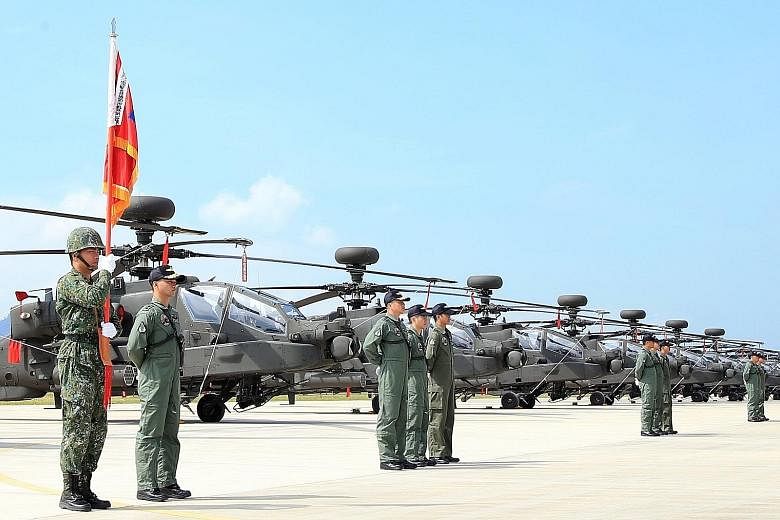Bilateral relations between the United States and China have entered turbulent waters, with Beijing lodging a formal protest against Washington's decision to sell US$1.42 billion (S$1.95 billion) in arms to Taiwan.
The arms sales, announced on Thursday, was the latest in a series of US actions related to China this week that Beijing has slammed for harming ties. It comes just one day after a proposal by a US Senate panel to allow American warships to call at Taiwan's ports.
Also on Thursday, Washington stepped up pressure on Beijing to rein in North Korea with new sanctions, including on the Bank of Dandong, which is accused of laundering money for North Korean companies.
Earlier this week, the US downgraded China and placed it among the worst offenders in its annual Trafficking in Persons report.
Taken in sum, these actions are likely to lead to strained ties, Chinese experts told The Straits Times.
Relations between China and the US had been warm since Chinese President Xi Jinping met US counterpart Donald Trump at the latter's luxury resort in Florida in April. Mr Trump even described his relationship with Mr Xi as "outstanding".
-
What Taiwan gets from arms package
-
The United States is selling Taiwan weapons worth US$1.42 billion (S$1.95 billion). The package includes items from American weapons firm Raytheon.
• 56 AGM-154C JSOW stand-off, air-launched glide missiles, valued at US$186 million
• 60 HARM anti-radar missiles, valued at US$148 million
• 46 MK-48 Advanced Technology heavy torpedoes, valued at US$250 million
• Upgrades to Taiwan's AN/SLQ-32(V)3 ship electronic warfare systems, valued at US$80 million, for four Kidd-class destroyers
• US$125 million in Standard Missile-2 air-defence weapons and upgrades
• US$175 million to upgrade 168 MK-46 torpedoes to MK-54 versions
The sale does not include Lockheed Martin's F-35 fighter jet or other advanced weapons that Taiwan wanted. BLOOMBERG
Mr Trump subsequently set aside tough moves on trade and regional issues, including those pertaining to the South China Sea, after Mr Xi committed to further pressure on Pyongyang.
But the US President appeared to be running out of patience with China on the North Korea issue. On Wednesday, he tweeted: "While I greatly appreciate the efforts of President Xi and China to help with North Korea, it has not worked out. At least I know China tried!"
The honeymoon seems to have ended with this week's events.
Chinese officials have responded angrily and accused the US of interfering in its domestic affairs.
Chinese Foreign Ministry spokesman Lu Kang told a press briefing yesterday that Beijing has lodged a formal protest with Washington on the arms sales, and that the decision "seriously violated the three Sino-US joint communiques, blatantly intervened in China's internal affairs, and undermined China's sovereignty and security interests".
China sees self-ruling Taiwan as a breakaway province. It has been increasing its military presence and putting pressure on its diplomatic allies to isolate the island since pro-independence leader Tsai Ing-wen became Taiwan's president last year.
China's Taiwan Affairs Office said yesterday that it was "resolutely opposed to any excuse the US uses to sell arms to Taiwan".
The statement came after Chinese Ambassador to the US Cui Tiankai said Washington's actions will undermine mutual confidence between the two countries.
"These actions show some forces in the US don't want to see a healthy development of the China-US relationship and don't want to see a strong China," Mr Cui told reporters in Washington.
He also labelled "absurd" the US position that the arms sale will bolster Taiwan's confidence in cross-strait dialogues with China.
Renmin University US-China expert Jin Canrong said Beijing is likely to take retaliatory measures against the US for the sanctions against Chinese companies.
"China has no objections on sanctions against North Korea, but when the whip of sanctions hits China, then there has to be a response," he said.
While a successful arms sale might draw a stern rebuke from Beijing, experts such as Professor Shen Dingli of Fudan University's Institute of International Studies said an agreement that leads to American ships docking in Taiwan ports will likely lead to a collapse of US-China ties.
"Such a move will be seen as infringing on Chinese sovereignty, and will irreversibly damage the foundation of US-China relations," he said.

